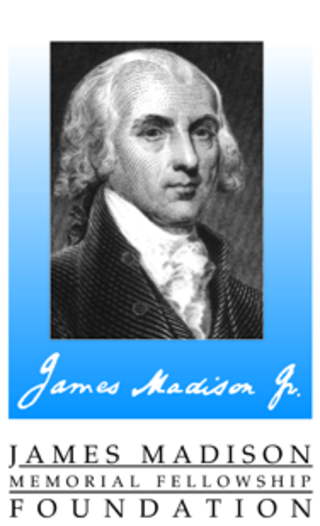
The National Defense Education Act (NDEA) was signed into law on September 2, 1958, providing funding to United States education institutions at all levels.

Postgraduate education, graduate education, or graduate school consists of academic or professional degrees, certificates, diplomas, or other qualifications usually pursued by post-secondary students who have earned an undergraduate (bachelor's) degree.
The Fulbright Program, including the Fulbright–Hays Program, is one of several United States Cultural Exchange Programs with the goal of improving intercultural relations, cultural diplomacy, and intercultural competence between the people of the United States and other countries through the exchange of persons, knowledge, and skills. Via the program, competitively-selected American citizens including students, scholars, teachers, professionals, scientists, and artists may receive scholarships or grants to study, conduct research, teach, or exercise their talents abroad; and citizens of other countries may qualify to do the same in the United States.
Student financial aid in the United States is funding that is available exclusively to students attending a post-secondary educational institution in the United States. This funding is used to assist in covering the many costs incurred in the pursuit of post-secondary education. Financial aid is available from federal and state governments, educational institutions, and private organizations. It can be awarded in the form of grants, loans, work-study, and scholarships. In order to apply for federal financial aid, students must first complete the Free Application for Federal Student Aid (FAFSA).

The Kenneth C. Griffin Graduate School of Arts and Sciences (GSAS) is the largest of the twelve graduate schools of Harvard University. Formed in 1872, GSAS is responsible for most of Harvard's graduate degree programs in the humanities, social sciences, and natural sciences. The school offers Master of Arts (AM), Master of Science (SM), and Doctor of Philosophy (PhD) degrees in approximately 58 disciplines.

The Courant Institute of Mathematical Sciences is the mathematics research school of New York University (NYU), and is among the most prestigious mathematics schools and mathematical sciences research centers in the world. Founded in 1935, it is named after Richard Courant, one of the founders of the Courant Institute and also a mathematics professor at New York University from 1936 to 1972, and serves as a center for research and advanced training in computer science and mathematics. It is located on Gould Plaza next to the Stern School of Business and the economics department of the College of Arts and Science.
The University of Virginia School of Education and Human Development is a public school of education in the United States in Charlottesville, Virginia. The School of Education and Human Development offers professional programs designed to prepare individuals for a variety of careers related to the practice of education. The current Dean of the School of Education and Human Development is Stephanie J. Rowley.
Studying abroad in the United States is the act of a student pursuing educational opportunities in the United States. This can include primary, secondary and post-secondary students. Studying abroad is determined in the United States by political rationales of national security and foreign policy. The number of students studying abroad represents only about 1% of all students enrolled at institutions of higher education in the United States.
The Institute for Citizens & Scholars is a nonpartisan, non-profit based in Princeton, New Jersey that aims to strengthen American democracy by “cultivating the talent, ideas, and networks that develop lifelong, effective citizens.” It administers programs that support civic education and engagement, leadership development, and organizational capacity in education and democracy.

The Thomas R. Pickering Foreign Affairs Fellowship Program is a graduate school fellowship program that provides funding for graduate students as they prepare academically and professionally to enter the U.S. Foreign Service.
The National Science Foundation Graduate Research Fellowship Program (NSF-GRFP) is a prestigious grant awarded annually by the National Science Foundation to approximately 2,000 students pursuing research-based Master's and doctoral degrees in the natural, social, and engineering sciences at US institutions. As of 2023, the fellowship provides an honorarium of $12,000 to be placed towards the cost of tuition and fees at the university the fellow attends; it also awards the student directly with an annual $37,000 stipend for three years, leading to an anticipated total award amount of $147,000.
The University of California, Irvine has over fourteen academic divisions.

The Center for Global Initiatives (CGI) is a research center at the University of North Carolina at Chapel Hill. It is part of the National Resource Center program of the U.S. Department of Education. CGI offers grants and scholarships to students and faculty to travel abroad, complete internships, and develop internationally focused courses. CGI also serves as the home to the Fulbright Program at UNC-Chapel Hill.
The Shastri Indo-Canadian Institute is a binational non-profit organization with registered charity status in Canada. The institute supports the creation of binational links between academia, government, the business community and civil society organizations by funding research and hosting seminars. It provides grants as well as internships and fellowships to provide opportunities for individuals to gain first-hand experience in India or Canada in their field of expertise. Furthermore, the Institute serves as a liaison between educational institutions and the Indian diaspora in Canada. Dr. B. Hariharan, Professor and Head, Institute of English, for the University of Kerala, is the president of the organization.

The James Madison Memorial Fellowship Foundation was established by the United States Congress in 1986 to encourage outstanding current and future secondary school teachers of American history, American government, and social studies in grades 7 through 12 to undertake graduate study of the roots, framing, principles, and development of the Constitution of the United States. The Foundation thus permanently commemorates the bicentennial of the Constitution and honors James Madison, fourth President of the United States and generally acknowledged "Father of the Constitution and the Bill of Rights."
The US–China Education Trust is a non-profit organization based in Washington D.C. Founded in 1998 by Ambassador Julia Chang Bloch, the first Chinese-American U.S. Ambassador, USCET seeks to promote China–United States relations through a series of education and exchange programs. The organization sponsors a variety of fellowships, conferences, workshops and exchanges, focused primarily on strengthening Chinese academic institutions related to the fields of American Studies, Media and Journalism, American Governance, and International Relations.

The Stanford Woods Institute for the Environment serves as Stanford University's environmental studies hub for faculty. An interdisciplinary research lab, Woods encompasses senior fellows and affiliated faculty as well as researchers, postdoctoral scholars, and students collaborating on sustainability research. It supports research in seven areas: climate, ecosystem services and conservation biology, food security, freshwater, oceans, public health, and sustainable development. It provides seed funding for environmental research and supports seven research centers, programs and workshops. In September 2022, it will become part of the Stanford Doerr School of Sustainability.
The Princeton Institute for International and Regional Studies (PIIRS) is the main research center for international studies and area studies at Princeton University and is one of the oldest centers of its kind in the United States. The Institute focuses on an interdisciplinary approach and its associated faculty is drawn from more than 150 professors and other scholars from more than 25 different departments within Princeton. Its director is political scientist Deborah J. Yashar, the Donald E. Stokes Professor of Public and International Affairs.

The Thomas J. Watson Foundation is a charitable trust formed 1961 in honor of former chairman and CEO of IBM, Thomas J. Watson. The Foundation's stated vision is to empower students “to expand their vision, test and develop their potential, and gain confidence and perspective to do so for others.” The Watson Foundation operates two programs, the Thomas J. Watson Fellowship and the Jeannette K. Watson Fellowship.
The Graduate School of Princeton University is the main graduate school of Princeton University. Founded in 1869, the school is responsible for all of Princeton's master's and doctoral degree programs in the humanities, social sciences, natural sciences, and engineering. The school offers Master of Arts (MA), Master of Science (MS), and Doctor of Philosophy (PhD) degrees in 42 disciplines. It also administers several pre-professional programs, including the Master in Finance (M.Fin.), Master of Science in engineering (M.S.E.), and Master of Engineering (M.Eng.), Master in Public Affairs (M.P.A.), Master in Public Policy (M.P.P.), and Master of Architecture (M.Arch.) degrees.








